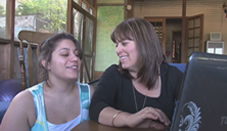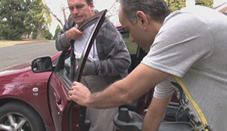
mother of Alana (with brain injury)
Attendant care workers provide assistance for people with disabilities to perform tasks they would normally be doing for themselves.
The attendant care will be unique to you and goal directed.
Good attendant care is where workers and services:
Keep you at the centre of planning and delivery of services
Work with you to achieve goals to increase and/or maintain independence.
Attendant care workers are professional workers and maintain professional boundaries.
Where the person with the injury is living with family members the worker will work appropriately within the family setting.
The attendant care will be culturally appropriate.
This site is about what its like having attendant care and how to get attendant care right.
If you are new to brain injury, spinal cord injury or attendant care it provides an orientation.
If you want to understand what the experience is like there are a lot of examples of people's experiences and case studies.
To help get attendant care right there are examples of what good attendant care looks like and a description of the principles and standards it's based on.
There are lots of resources.



Alana had a serious car accident aged 14. She has a brain injury. She completed her HSC and lives with parents and sisters
When David was 20, he had car accident. He has a brain injury. He has returned to work and to driving.
Karel had a serious bicycle accident. It left him with a fractured spine. He lives with his wife. They are in their 80s.
Emma and her newborn baby were hit by a car on their first time out walking. She has a brain injury and needs 24 hour care.